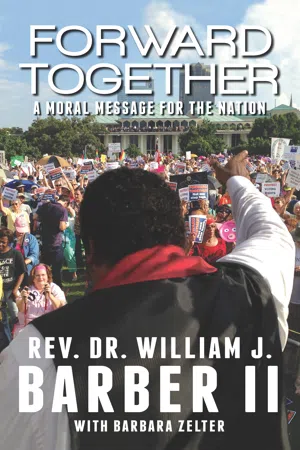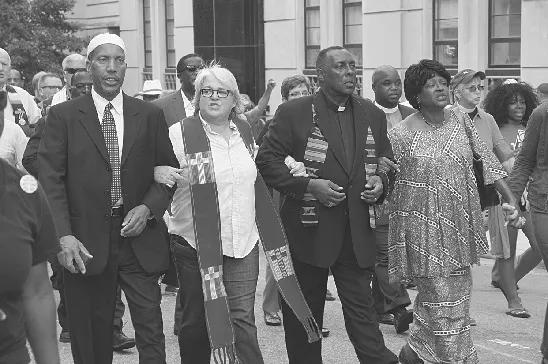![]()
1
“THE NEED TO KNOW WHO WE ARE IN TIMES LIKE THESE”
HISTORIC THOUSANDS ON JONES STREET RALLY 7
FEBRUARY 15, 2013 [NO CIVIL DISOBEDIENCE]
The moral fusion across faiths, genders, generations, and ethnicities—Imam Adam Beyah, Rev. Nancy Petty, Rev. Nelson Johnson, Joyce Johnson (Phil Fonville photo)
We know who we are. We know we are called to bear witness at this moment of history.
We have faith there is a better way for North Carolina. There is a better way for America. There is a better way for our world. We mobilize for a better way.
BACKGROUND
For the last six years on the Saturday nearest to the date the NAACP was founded (President Lincoln’s birth date, February 12), the NC NAACP has organized thousands of diverse and equal people and organizations for an assembly known as “Historic Thousands on Jones Street” (HKonJ). Jones Street in Raleigh is where the North Carolina General Assembly meets and rules. This gathering’s purpose has been to remind us and our representatives to whom we have temporarily ceded some of our powers that, as our state Constitution reminds us, power must be based in the will of the people and used only for the good of the whole.
Recognizing that the representatives sent by voters to the People’s House on Jones Street have life-and-death powers over every man, woman, and child in North Carolina, the NC NAACP began in 2006 to build a diverse and inclusive People’s Assembly. The convergence came after Rev. Dr. Barber and his team assumed leadership over the NC NAACP, the most powerful and oldest anti-racism organization in the nation. Starting with 16 partners and about five thousand delegates and individuals who attended the first People’s Assembly in February 2007, each year more and more partners, delegates, and ordinary concerned people have joined the Movement.
At the seventh People’s Assembly in February of 2013, individuals representing 145 coalition partners and others gathered at historic Shaw University, where the Student Nonviolent Coordinating Committee (SNCC) was founded in 1960, and walked the mile or so to the People’s House on Jones Street. They came from diverse backgrounds, organizations, and regions of the state. They were old, young, middle-aged, gay, straight, black, white, Latino, Asian American, and Native American. They were pro-labor champions and people who had no idea what a labor union was. They were deeply religious people, and people who had given up on organized religion. But they all agreed with the essentials of the 14-Point anti-racist, anti-discrimination, anti-poverty, anti-militarism and pro-justice agenda of the Assembly.
The seventh HKonJ Assembly focused on ending poverty and economic injustice, following the highly successful Truth and Hope Tour of Poverty that the NC NAACP and some of its partners had conducted in 2012. Advocates, scholars, journalists, and students shared a big bus and drove across North Carolina to dozens of impoverished areas, putting a face on poverty.
The General Assembly—as opposed to the People’s Assembly—had just arrived in Raleigh. It was dominated by politicians who were recruited and funded by national right-wing groups determined to consolidate the old conservative and discriminatory folkways of the South, in order to provide a Southern base for a national attack on civil rights advancement and progressive policies.
NORTH CAROLINA CONSTITUTION, ARTICLE I, DECLARATION OF RIGHTS
That the great, general, and essential principles of liberty and free government may be recognized and established, and that the relations of this State to the Union and government of the United States and those of the people of this State to the rest of the American people may be defined and affirmed, we do declare that:
SECTION 1. THE EQUALITY AND RIGHTS OF PERSONS. We hold it to be self-evident that all persons are created equal; that they are endowed by their Creator with certain inalienable rights; that among these are life, liberty, the enjoyment of the fruits of their own labor, and the pursuit of happiness.
SECTION 2. SOVEREIGNTY OF THE PEOPLE. All political power is vested in and derived from the people; all government of right originates from the people, is founded upon their will only, and is instituted solely for the good of the whole.
SECTION 3. INTERNAL GOVERNMENT OF THE STATE. The people of this State have the inherent, sole, and exclusive right of regulating the internal government and police thereof, and of altering or abolishing their Constitution and form of government whenever it may be necessary to their safety and happiness; but every such right shall be exercised in pursuance of law and consistently with the Constitution of the United States.
Properly defining oneself, one’s nature, and one’s calling is a critical philosophical discipline that has penetrating practical implications. This task is particularly compelling when one is in crisis or facing seasons of challenge or confronting threats that seek to take one’s identity and/or redefine it. Knowing who you are is critical to your sanity and your ability to sustain yourself when facing what Paul Tillich called the very threat of non-being and non-existence. This is how the slaves made it through slavery. Yes, they were called everything but children of God by the oppressive slave masters and system of slavery, but somehow deep in their spiritual DNA they were able to yet sing: Before I be a slave, I’ll be buried in my grave, and go home to my Lord and be free. They knew they were not slaves.
The civil rights and justice communities know this lesson well. For 104 years, the NAACP and other civil rights organizations have been dismissed, cussed, and feared by those who did not want to deal honestly with issues of racial and class disparities. When whites and blacks put out the call for forming the NAACP on what would have been Lincoln’s one-hundredth birthday, February 12, 1909, they were called un-American and disturbers of the peace, even Communists.
Dr. King was called a troublemaker and even a race-baiter 45 years ago as he led the call for a civil rights and economic justice Movement. He called for a Poor People’s Movement to address the glaring realities of poverty even as he loved America enough to say: Let us be dissatisfied until America will no longer have a high blood pressure of creeds and an anemia of deeds.1 Dr. King loved the world enough to say that the Evil Triplets of poverty, racism, and war are forms of violence that exist in a vicious cycle, interrelated. They stand as barriers to our living in a Beloved Community. Few listened.
Nevertheless, this vision resonated with black and white students from the urban and rural communities of America, who started the sit-in Movement, and SNCC, the Southern Nonviolent Coordinating Committee that was born in Raleigh, North Carolina, under the tutelage of our own rural scholar and activist, Ella Baker. The young SNCC leaders were maligned and disrespected by those who wanted to maintain the status quo of inequality, but they kept on because they knew who they were.
From Moses to Jesus, the Bible tells us that those who fought for justice—those who spoke truth to power, those who refused to accept that injustice and inequality had to exist and that there was no better way—always found themselves hated, hounded, and heaped upon with false accusations simply because they believed in the necessity of speaking and working for the cause of righteousness and building a more just community. This lack of majority support is why the just must live by faith and must know exactly who we are.
As we gather here on February 9, 2013, some will try to define us in their own ways and will try to obstruct and obfuscate our message. Given that skewing, we must know ourselves. We must know where we stand.
The Historic Thousands on Jones Street (HKonJ) People’s Coalition is made up of tens of thousands of ordinary North Carolinians: African Americans, Latinos, Americans of European ancestry, Native Americans, Asian Americans, old and young, gay and straight, all of us human beings who share a vision of enough for all.
We stand against systems and policies rooted in systemic classism and racism. The term classism can refer to personal prejudice against so-called lower classes as well as to institutional classism, just as the term racism can refer strictly to personal bigotry or to institutional racism that displays itself in areas of housing, jobs, education, banking, and every other area that shapes work life and opportunities for success in our land.
Our agenda is justice. We believe that when the economic, social, and spiritual life of our state moves toward justice, the circulation of the blood of politics improves, which is a healthy thing.
We mourn the grim realities of so many North Carolinians:
Last year we visited 27 towns, cities, and counties on our Truth and Hope Poverty Tour, to put a face on these numbers. We cannot ignore this issue of dire poverty in our midst and the suffering of these individuals, our bro...

